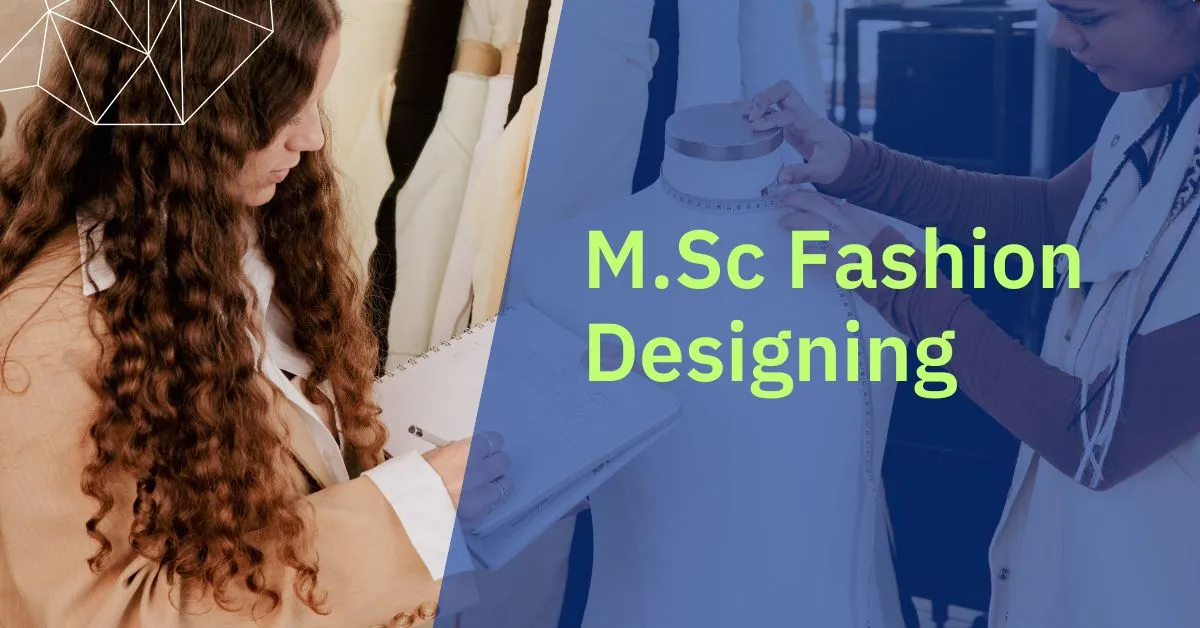


13, May 2023
The full form of M.Sc in Fashion Designing is Master of Science in Fashion Designing. Fashion designing is a creative and artistic discipline that involves the design, creation, and production of clothing and accessories. It is the process of conceptualizing and developing unique and aesthetically pleasing garments that reflect current trends and styles. Fashion designers are responsible for creating clothing that not only looks visually appealing but also meets the functional and practical needs of individuals.
Fashion designing encompasses various aspects, including:
Research and Inspiration: Fashion designers conduct extensive research to gain inspiration and stay updated on the latest fashion trends, styles, and consumer preferences. They analyze historical fashion movements, cultural influences, and societal changes to develop a design concept.
Sketching and Illustration: Designers use their artistic skills to create sketches and illustrations that bring their design ideas to life. These sketches serve as a visual representation of the garments, showcasing details such as silhouettes, colors, and fabric textures.
Fabric Selection: Choosing the right fabric is crucial in fashion designing. Designers consider factors such as texture, drape, durability, and suitability for the design concept. They experiment with different fabrics to achieve the desired aesthetic and functionality.
Pattern Making and Garment Construction: Once the design is finalized, fashion designers create patterns, which are templates used to cut fabric pieces and assemble them into a garment. They utilize various techniques, such as draping, flat pattern making, and computer-aided design (CAD), to bring the design to life.
Sewing and Embellishments: Fashion designers have expertise in sewing techniques and garment construction. They work with skilled tailors and seamstresses to ensure that the garments are accurately sewn and finished. Additionally, designers may incorporate embellishments like embroidery, beading, or prints to enhance the visual appeal of the garments.
Trend Forecasting and Marketing: Fashion designers need to anticipate and predict future trends to stay relevant in the industry. They analyze market trends, consumer behavior, and fashion forecasts to create collections that cater to the preferences of their target audience. They also collaborate with marketing and branding professionals to promote and market their designs effectively.
Msc Fashion Designing Course Eligibility Criteria:
To be eligible for an M.Sc in Fashion Designing course, candidates must fulfill certain criteria, which may vary slightly from one institution to another. However, here are the general requirements:
Educational Qualifications: Candidates should have completed a Bachelor's degree in Fashion Designing or a related field from a recognized university. Some institutions may also accept candidates with a background in arts, design, or textiles.
Minimum Marks: Most universities require candidates to have a minimum aggregate score of 50% or above in their undergraduate degree.
Entrance Exams: Some institutions conduct entrance exams to assess the aptitude and creativity of candidates. The scores obtained in these exams may be considered during the admission process
The syllabus of M.Sc Fashion Designing courses may vary slightly depending on the institution and specialization chosen. However, here is a general outline of the subjects that are typically covered in an M.Sc Fashion Designing course:
Fashion Design Principles and Concepts:
Fashion Illustration and Design:
Textile Science and Technology:
Pattern Making and Garment Construction:
Fashion Marketing and Merchandising:
Fashion Business and Entrepreneurship:
Fashion Research and Trend Analysis:
Specialization Electives:
Depending on the institution and program, students may have the opportunity to specialize in specific areas of fashion design, such as:
Note: The above syllabus is a general representation and may vary from
one institution to another. It is always recommended to refer to the specific syllabus provided
by the institution offering the M.Sc Fashion Designing course for detailed and accurate
information.
There are several entrance exams conducted by various institutions for admission to M.Sc Fashion Designing programs. Here are some popular entrance exams in India for M.Sc Fashion Designing:
NIFT Entrance Exam (National Institute of Fashion Technology): NIFT conducts a national-level entrance exam known as the NIFT Entrance Exam. It is conducted for admission to undergraduate and postgraduate fashion design programs, including M.Sc Fashion Designing.
Pearl Academy Entrance Exam: Pearl Academy conducts its own entrance exam for admission to its fashion design programs, including M.Sc Fashion Designing. The exam assesses the candidate's design aptitude, creativity, and communication skills.
NID Entrance Exam (National Institute of Design): Although NID primarily offers design courses at the undergraduate and postgraduate level, it is worth checking if they offer any M.Sc Fashion Designing programs. NID conducts its own entrance exam known as the NID Entrance Exam for admission to their design programs.
CEED (Common Entrance Examination for Design): CEED is a national-level entrance exam conducted by the Indian Institute of Technology (IIT) for admission to various design programs, including M.Sc Fashion Designing, at participating institutions.
State-level Entrance Exams: Some states in India may conduct their own entrance exams for admission to fashion design programs, including M.Sc Fashion Designing. These exams may vary from state to state, so it is advisable to check with the respective state authorities for more information.
It is important to note that the specific entrance exams and their eligibility criteria may vary from institution to institution. It is recommended to visit the official websites of the respective institutions offering M.Sc Fashion Designing programs to obtain accurate and up-to-date information about their entrance exams.
Several reputed colleges and universities offer M.Sc Fashion Designing courses. Here are a few well-known institutions:
National Institute of Fashion Technology (NIFT): NIFT has campuses across India and is renowned for its fashion design programs. It offers a two-year M.Sc program in Fashion Designing.
Pearl Academy: Pearl Academy is a prestigious institution offering design and fashion-related courses. It provides a two-year M.Sc program in Fashion Design and Business.
Symbiosis Institute of Design (SID): SID, a constituent of Symbiosis International University, offers a two-year M.Sc program in Fashion Design and Fashion Communication.
National Institute of Design (NID): NID, located in Ahmedabad, is known for its excellence in design education. It offers a two-year M.Des (Master of Design) program with a specialization in Fashion Design.
Amity School of Fashion Technology: Amity University offers a two-year M.Sc program in Fashion Designing. The program focuses on developing creative and technical skills in the field of fashion design.
Completing an M.Sc in Fashion Designing opens up a wide range of job prospects and career options in the fashion industry. Here are some popular career paths and job opportunities for M.Sc Fashion Designing graduates:
Fashion Designer: Many graduates choose to work as fashion designers, creating innovative designs and collections for clothing and accessories. They may work for fashion houses, design studios, or start their own fashion labels.
Fashion Illustrator: Fashion illustrators are responsible for creating visual representations of fashion designs. They use their artistic skills to produce sketches, drawings, and digital renderings that showcase the design concept and details.
Fashion Stylist: Fashion stylists work with individuals, fashion publications, or brands to curate and create visually appealing outfits. They have an eye for fashion trends, knowledge of different styles, and the ability to create cohesive looks.
Fashion Merchandiser: Fashion merchandisers are involved in the planning and execution of product strategies for fashion brands. They analyze market trends, consumer behavior, and sales data to determine product assortments, pricing, and promotional strategies.
Fashion Product Developer: Fashion product developers oversee the process of bringing fashion designs from concept to production. They work closely with manufacturers, suppliers, and production teams to ensure that the designs are translated into high-quality garments.
Textile Designer: Textile designers specialize in creating unique and visually appealing fabric designs. They work with different techniques such as printmaking, weaving, and embroidery to develop textiles that are used in fashion and other industries.
Fashion Buyer: Fashion buyers are responsible for selecting and purchasing merchandise for retail stores or fashion brands. They analyze market trends, negotiate with suppliers, and make purchasing decisions based on consumer demand and business objectives.
Fashion Entrepreneur: With the knowledge and skills gained from an M.Sc in Fashion Designing, graduates can start their own fashion-related businesses, such as fashion labels, boutiques, online stores, or consultancy services.
Fashion Consultant: Fashion consultants provide expert advice and guidance to individuals or companies on fashion-related matters. They may assist with personal styling, image consulting, wardrobe management, or fashion branding.
Fashion Educator: Graduates with an M.Sc in Fashion Designing can pursue careers in academia as fashion educators or professors. They can teach at design institutes, colleges, or universities and impart their knowledge and expertise to aspiring fashion designers.
What is the duration of an M.Sc Fashion Designing course?
Ans. The duration of an M.Sc Fashion Designing course is typically two years. However, the duration may vary depending on the institution and program structure.
What is the difference between an M.Sc Fashion Designing and an M.Des (Master of Design) in Fashion Design?
While both degrees focus on fashion design, an M.Sc in Fashion Designing typically emphasizes a scientific and research-oriented approach to fashion, including subjects like textile science and technology. On the other hand, an M.Des in Fashion Design places more emphasis on the design and creative aspects of fashion.
Can I pursue an M.Sc Fashion Designing course without a background in fashion or design?
Some institutions may accept candidates with a background in arts, design, textiles, or related fields. However, it is advisable to check the eligibility criteria of the specific institution offering the course as it may vary.
Are there any scholarships available for M.Sc Fashion Designing programs?
Some institutions and organizations offer scholarships and financial assistance for M.Sc Fashion Designing programs. It is recommended to check with the respective institutions or explore external scholarship opportunities.
What are the skills required to excel in the field of fashion designing?
Key skills for success in fashion designing include creativity, artistic flair, strong visual and design sense, good communication and presentation skills, knowledge of textiles and fabrics, attention to detail, and the ability to work in a team and meet deadlines.
What is the scope of international opportunities after completing an M.Sc Fashion Designing?
Completing an M.Sc Fashion Designing opens up opportunities for international careers in the fashion industry. Graduates can work with international fashion houses, participate in fashion events and shows globally, collaborate with international designers, or even launch their own global fashion brands.
Can I pursue a Ph.D. in Fashion Designing after completing an M.Sc?
Yes, after completing an M.Sc in Fashion Designing, you can choose to pursue a Ph.D. in Fashion Designing or a related field. A Ph.D. provides opportunities for advanced research and academic careers in the field of fashion design.
What are some important industry events and platforms for fashion designers?
Fashion designers can showcase their work and gain exposure through industry events and platforms such as fashion weeks, trade fairs, exhibitions, and online fashion platforms. Examples include New York Fashion Week, Paris Fashion Week, Milan Fashion Week, London Fashion Week, and various international fashion trade shows.
How can networking and internships help in the fashion designing industry?
Networking is crucial in the fashion industry as it helps build professional connections and collaborations. Internships provide valuable industry experience, exposure to real-world projects, and the opportunity to learn from experienced professionals. Both networking and internships can lead to job opportunities and career growth in the fashion designing industry.